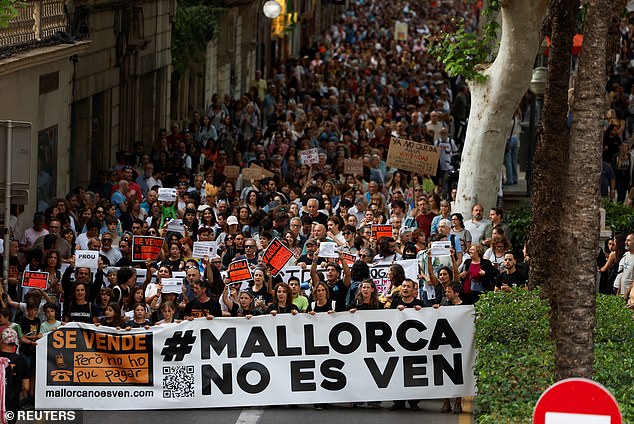The authorities in Mallorca have asked anti-mass tourism protesters who will take over Palma on Sunday to leave British tourists alone.
Regional government chiefs have made clear there must be no repeat of Barcelona, where tourists were sprayed with water pistols by protesters earlier this month.
Foreign tourists were booed and mocked by some locals as they dined on the terraces of Palma’s Plaza Weyler during the latest protest in the Mallorcan capital on May 25.
The organizers ended up publicly apologizing for the abuse they received.
In a clear sign that Balearic politicians are concerned that Sunday’s new demonstration could be marked by displays of tourismophobia, they have urged locals to show “respect” to tourists.
People hold a banner reading ‘Mallorca is not for sale’, as they take part in a protest against mass tourism and gentrification on the island, ahead of the summer season in Palma de Mallorca in May.
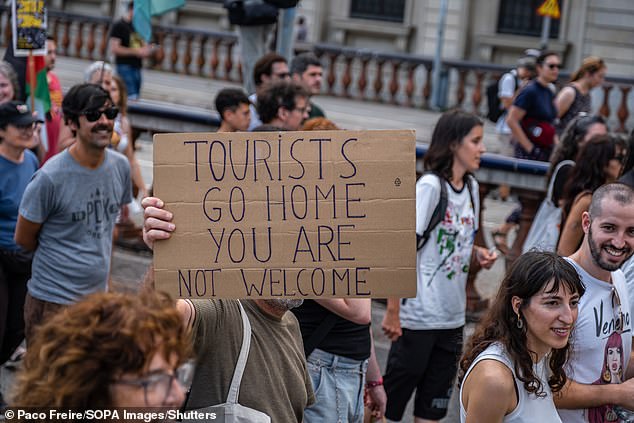
An anti-tourism banner during an anti-tourism demonstration in Barcelona earlier this month. More than 3,000 people have demonstrated against the overcrowding of tourists in the city of Barcelona and in favour of policies to reduce tourism.
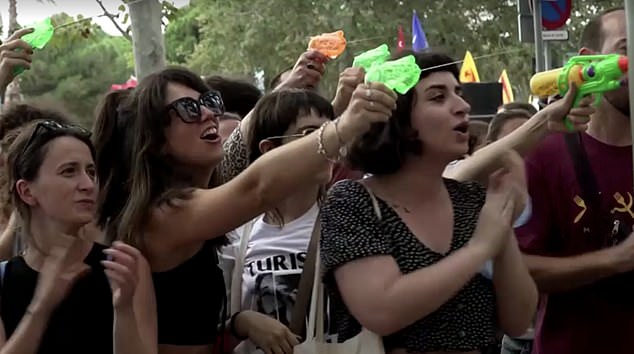
Protesters fired water pistols at tourists eating at popular spots in the city.
Regional government spokesman Antoni Costa showed overnight that officials were concerned despite bizarrely insisting publicly that they were not, saying: “There is no fear because it hasn’t happened here and people have always been respectful.”
‘But we have seen a certain type of behaviour in Barcelona which, as you can imagine, we did not like.
‘We ask for the utmost respect for those who have decided not to protest and we urge those who do so to do so peacefully and not to disrupt other citizens and visitors.’
Spain’s tourism minister has condemned protesters who sprayed tourists with water pistols during a protest on July 6 in downtown Barcelona.
Jordi Hereu, former mayor of Barcelona, described his actions as reprehensible.
He went on to say that they do not represent the country’s culture of hospitality, insisting: “I want to reaffirm the values of Spanish hospitality and the Spanish tourism model and one of its characteristics, which is safety.”
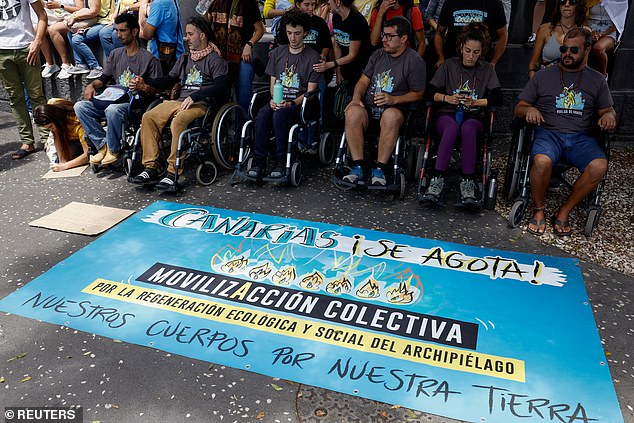
People on hunger strike sit in wheelchairs during a protest for a change in the tourism model in the Canary Islands, in Santa Cruz de Tenerife, Spain, in April.
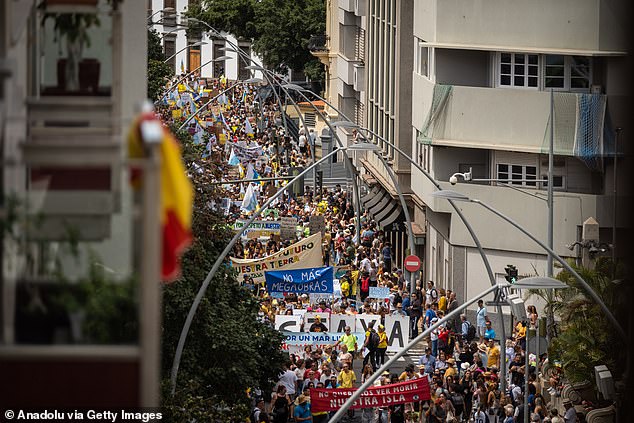
Protesters flood the streets of Tenerife in April calling on local authorities to temporarily limit visitor numbers to ease pressure on the islands’ environment, infrastructure and housing stock, and to curb property purchases by foreigners.
Spanish hoteliers have admitted that anti-mass tourism protests that have taken place in many parts of Spain since April, when thousands took to the streets in the Canary Islands, have left some tourists feeling they are not welcome.
Gabriel Escarrer, president of the NGO Exceltur, formed by the presidents of the 30 main Spanish tourism groups, recently said: “It is the worst thing that could happen.”
The organisers of this Sunday’s protest in Palma are already predicting that it will be “historic”.
Originally, people from all four Balearic Islands, including Ibiza and Menorca, were due to take to the streets of their respective capitals on the same day, but those plans were scrapped in favour of separate but coordinated actions over the summer.
Yesterday, the unions UGT, CCOO and STEI, which had called on citizens to join the demonstrations on Sunday, called for an economic model that “does not generate job insecurity.”
In a joint press conference, the general secretary of CCOO, José García, the spokesperson for UGT Baleares, Xisca Garí, and the general secretary of STEI, Miquel Gelabert, have stated that mass tourism is “unsustainable” since it increases the workload of residents and does not improve their quality of life.
Anti-tourism protests have spread across Spain in recent months as locals demand tighter controls on tourists.
Earlier this month, under the slogan ‘Enough! Let’s put limits on tourism’, some 2,800 people – according to the police – marched through a neighbourhood on Barcelona’s seafront to demand a new economic model that would reduce the millions of tourists who visit the city every year.
Protesters carried signs reading “Barcelona is not for sale” and “Tourists, go home”, before some used water pistols on tourists eating outdoors at restaurants in popular tourist spots. Chants of “Tourists, get out of our neighbourhood” could be heard as some stopped outside hotel entrances.
Rising house prices in Barcelona, which have increased by 68 percent in the past decade, are one of the main problems of the movement, along with the effects of tourism on local commerce and working conditions in the city of 1.6 million inhabitants.
On the other hand, tourist saturation has become the main concern in Mallorca in recent months. The Balearic Islands received almost 18 million tourists last year and this year reservations for the summer have increased by 15%, according to the president.
In the Canary Islands, 50,000 people took to the streets of Tenerife in April to protest against tourism on the island.
Protesters waved signs reading “You enjoy, we suffer”, claiming that the huge influx of tourists to the island is causing huge environmental damage, driving down wages and driving locals out of cheap, affordable housing, forcing dozens of people to live in tents and cars.
(tags to translate)dailymail

